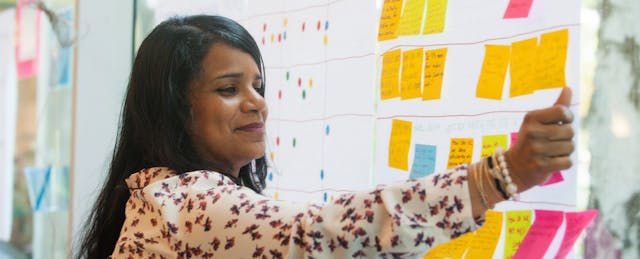According to the most recent data available in the 2014 Oakland Achieves Progress Report, only 51% of Oakland’s high schoolers completed A-G (minimum requirements to apply to a UC or Cal State school) and even fewer (46%) enrolled in a post-secondary program. These data represent both traditional and charter public schools combined.
Making no significant changes to the way we do schooling in Oakland guarantees these uninspiring results. Or at best, we will inch our way forward, while too many students wait for real change to come to them. If we expect different results, we need to try something different.
This spring we are trying something different. Ten Oakland schools recently began a new exploration into the complex and exciting world of school redesign through the Next Generation Learning Challenges in Oakland (NGLC in Oakland). This work, supported locally Oakland Unified School District, the Oakland Public Education Fund (The Ed Fund), and Rogers Family Foundation (RFF), isn’t only about spurring new school models. It’s about empowering school-based design teams of administrators, teachers, parents and students to dream their own dream for what school needs to be, and align that vision to the principles of personalized learning.
In the fall, before any grant-making, we wanted to inspire schools and support them to learn more about personalization. To do this we combined workshops and school visits to give educators an idea of what’s possible. RFF organized “Discovery Phase” events where educators across the city gathered to learn more about the principles of personalized learning informed by the national NGLC team and our own local leadership and initiatives, including:
- Individual Learner Profiles
- Personal Learning Paths
- Competency-based Progression
- Flexible Learning Environment
- Social and Emotional Learning (SEL)
- Linked Learning
Great consultative organizations such as Education Elements, The Alvo Institute, and Mastery Design Collaborative (MDC) hosted many of our workshops, providing both breadth and depth on topics such as individualized learning plans, meeting the needs of English Language Learners, and how to create a vision for a new “Next Generation” school model. We also visited school systems such as Summit Public Schools, Rocketship,and Milpitas USD.
After engaging over 300 educators in over 30 workshops and events through the Discovery Phase, school teams were invited to complete Planning Grant applications. A team of local and national personalized and blended learning experts chose 10 winners from a pool of 26 applicants from Oakland public schools. The application asked schools to reflect on their current practices and how they might improve. Schools were also scored on how well their vision and budgets for personalized learning matched the problem(s) they wanted to solve, as well as their capacity to manage systems change.
These planning grant winners – five district-run and five public charter – represent novel combinations of promising and proven solutions, as well as groundbreaking partnerships. A few of their ideas include:
- Personalizing professional development of teachers
- Changing class sizes (both number of students with different adults and square footage of rooms)
- Using Maker and Fab Labs --- think Woodshop for the 21st Century -- to engage students in high-interest, standards-aligned projects
- Increasing and/or creating new internship and other off-campus opportunities for students
- Using more/different adaptive online content programs to blend learning
- Designing Montessori-inspired curriculum and projects for middle schoolers, including the role of technology.
Winning a planning grant is just one step in a larger process. The school teams will spend the next year developing their school designs, ultimately competing to be among three to four schools to receive a $300,000-$400,000 launch grant starting in the 2016-2017 school year.
In addition to planning grants ($60,000-$100,000 per school), the ten school design teams now form a new cohort and will be supported with MDC’s Reimagine School program, a program that consists of a series of day-long collaborative workshops and site-specific consultative support for design. The cohort will also have the opportunity to visit other innovative schools in the region and nationally. Schools in the cohort will use MDC’s program to engage in short cycle pilots, length to be determined by each school, between now and late Fall to test out different ways to better personalized learning for students. For example, some schools may engage in a complete cycle this spring, iterate and run version 2.0 of the prototype in a second cycle over the summer, and then run a third prototype potentially a third in the Fall. The goal of the pilots is to iterate, improve, and scale a transformative idea.
Our hope is that the NGLC in Oakland grant program can be one of many pathways Oakland schools use to achieve lasting positive change for kids. It’s important that we support school design teams to strive for excellence and solve for the whole child, on standardized assessments and beyond.
Our ten schools are designing schools for the future -- for their students’ future. Our school design teams bring a capacity to take on big challenges, manage change effectively, research and learn about promising educational practices and a willingness to try something different -- all in service of dramatically better outcomes for kids.


